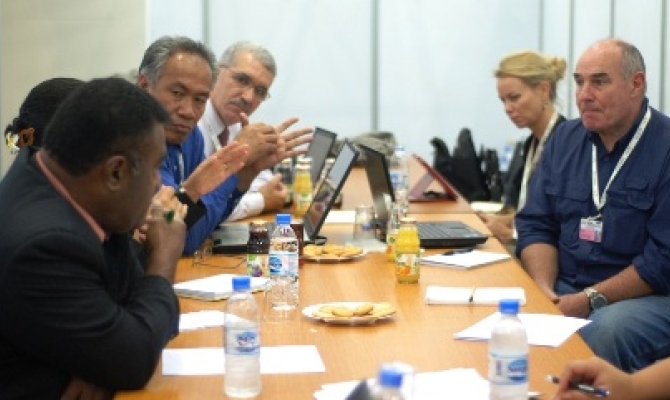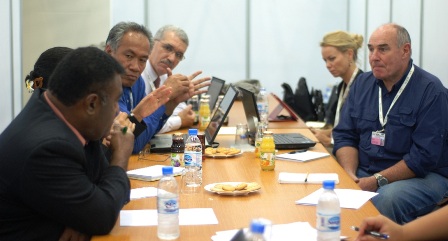
18 October, Changwon Korea - While many of you may wonder why the Pacific is a part of the United Nations Convention to Combat Desertification, given we don't have any deserts in the Pacific, the range of this convention goes beyond desertification to include land degradation and drought.
For our corner of the world, land degradation and, as we are seeing right now in Tuvalu and some other small islands, drought is a crucial issue. Without fertile land and adequate water Pacific livelihoods and our way of life is at risk.
 SPREP and Global Mechanism meet with Pacific country delegates
SPREP and Global Mechanism meet with Pacific country delegates
This week in Changwon, Korea a team of three from the Secretariat of the Pacific Regional Environment Programme (SPREP) is providing technical and communications support to 10 Pacific island countries attending the 10th Conference of the Parties to the UNCCD. This convention, which has 193 state party signatories, 14 of these are from the Pacific island region.
Inside the contact groups of the two week meeting, where the actual negotiations take place, the Pacific raises its collective voice as part of the wider Asia grouping to ensure that our concerns are heard amongst 193 other countries.
As part of the support from SPREP, the inter-governmental environment organisation coordinated a regional preparatory meeting in August, for all Pacific parties to this convention to meet and form a united voice and way forward at the UNCCD COP 10.
"The COP process provides an opportunity for the Pacific delegates to outline the role of their island nation in the global village," said Bruce Jefferies the Terrestrial Ecosystems Management Officer at SPREP.
"We are aligned with the Asia Pacific region and it is easy to be subsumed by the big countries of Asia, such as India, Pakistan and Thailand, but we all experience similar problems, it's just that in terms of scale the impacts are several times above what we experience in the Pacific, make no mistake the impacts on communities and natural resources are the same in our countries."
One of the take home lessons for Jefferies was a presentation made during the first round table of the high level segment of the UNCCD by Dr Dennis Garrity, the Drylands Ambassador who shared a success story from North Africa in Burkina Faso where traditional and contemporary knowledge was combined with the vision and commitment of a local farmer. This involved planting indigenous trees, which in turn, progressively transformed degraded dry lands into productive forest and grazing lands.
Jefferies is hopeful the Pacific would be able to adopt and apply this method into a Pacific success story using appropriate indigenous species.
"This was very impressive and has a lot of potential for us in the Pacific. If we can develop the approach and find the right species, that can provide nutrients, fodder, timber and the ability to under plant productive crops this could be a good intervention for us in the Pacific as we have the advantage of working with smaller scale lands."
Jefferies remains in Korea until the end of the 10th Conference of the Parties to the UNCCD accompanied by Tepa Suaesi, the Environment Planning Officer and Nanette Woonton, the Media and Public Relations Officer.
The UNCCD COP 10 is held in Changwon, Korea from 10 October to 21 October, 2011
More news and images available on the Bionesian Blog.